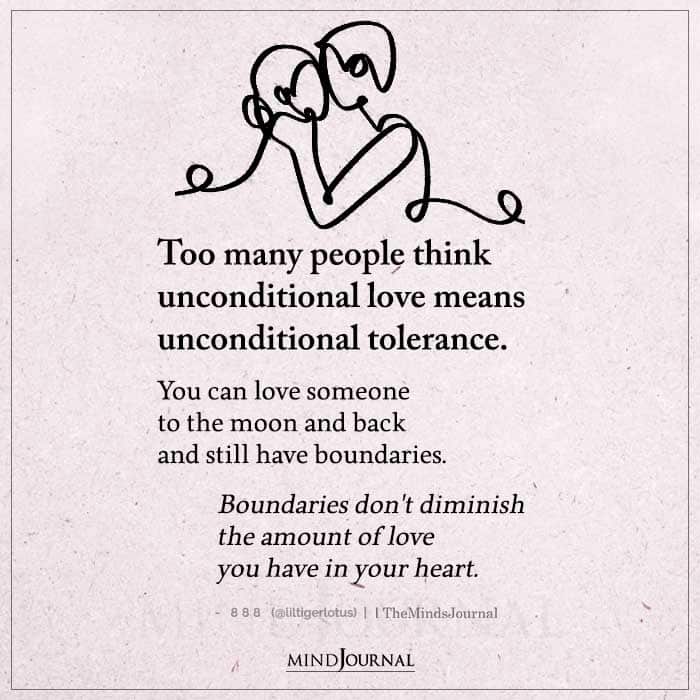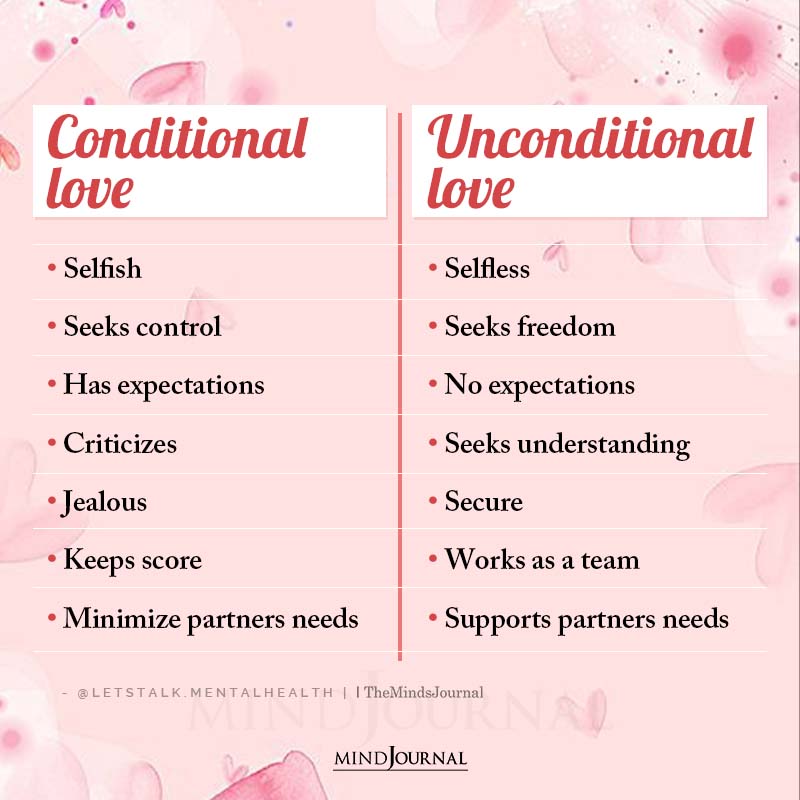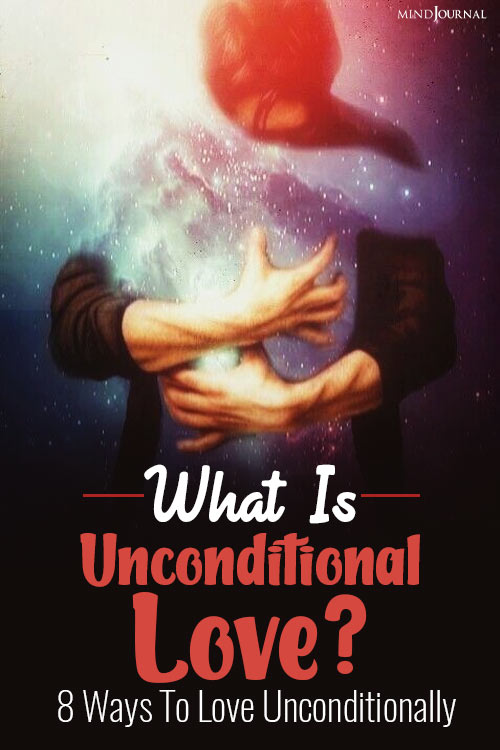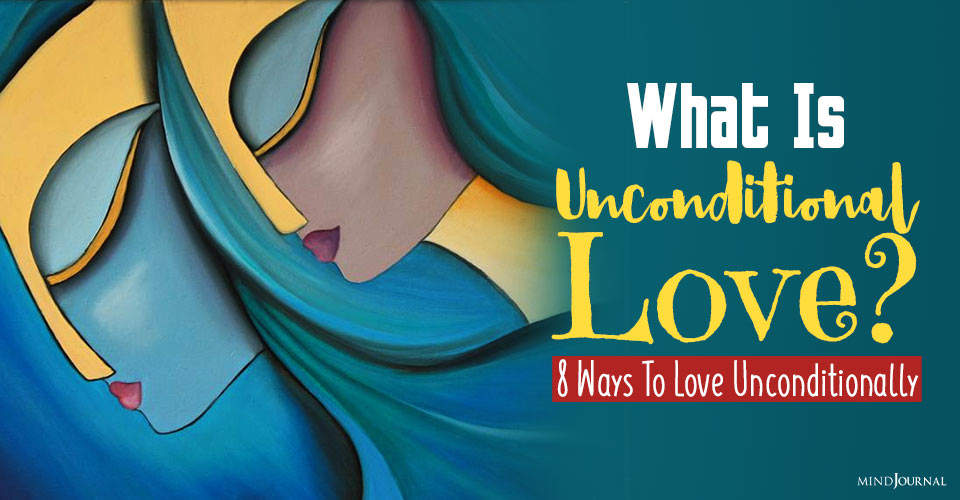We all want true love in our lives, but but do we really know what is love is? While the concept of love varies, the meaning of unconditional love goes way deeper than we may think. Here’s what is unconditional love and how it is different from conditional love.
Unconditional love is so vastly different from the love we are used to receiving that most of us don’t really know what it is. In fact, most “love” these days isn’t actually true love, but instead differing forms of infatuation, lust, affinity, affection, codependency, or egotistical neediness.
The reality is that true love is rare and immensely precious. The moment you experience true unconditional love is the moment you feel completely seen, understood, forgiven, accepted, and loved just as you are.
This feeling is the most embracing and liberating sensation you will ever experience. Indeed, unconditional love is the most healing force in the universe. Yet unfortunately, we are so starved from experiencing it regularly in our daily lives that we become emotionally and spiritually ill.
One of the saddest sights you will ever see is a being who has been completely deprived of unconditional love – and we have all experienced it at some point. But you don’t need to stay malnourished any longer. As we’ll explore, unconditional love is open for you to access in any moment, no matter where you are, or what you’re doing.
What is Unconditional Love?
“Unconditional love is not so much about how we receive and endure each other, as it is about the deep vow to never, under any condition, stop bringing the flawed truth of who we are to each other.”
– Mark Nepo
Unconditional love essentially means loving someone or something without any conditions. In other words, no matter what another person says, does, feels, thinks, or believes in, we still love them unconditionally.

Unconditional love can also be applied to other beings such as animals and even emotions and thoughts. But perhaps most importantly, unconditional love can be applied directly to ourselves in the form of self-love. The more we are able to love ourselves unconditionally, the more we are equipped to love others in the same way.
This principle echoes the famous words of Jesus, “Love your neighbor as yourself” and other enlightened masters such as Lao Tzu who said, “When you accept yourself, the whole world accepts you.”

Read: 8 Signs That Prove You Have Finally Found True Love
What is Conditional Love?
Conditional love is the complete opposite of unconditional love. In fact, conditional love isn’t really “love” in the truest sense of the word, because it comes from the ego, not from the heart.
Unlike unconditional love which is given freely, conditional love has to be “earned.” When this false form of love is earned, only then is affection, respect, and kindness given.
While unconditional love is limitless and boundless, conditional love is restricted and limited. While unconditional love doesn’t need anything from the other, conditional love is given only when something is received.
The equation looks like this: I will love you only if ………. (you do this, say that, provide this, make me feel this way).
Conditional love is inherently selfish and ego-centered. Conditional love only lasts so long as certain unspoken rules are maintained or met. Some of the most common unspoken rules that underpin conditional love include:
- I will love you only if you make me feel good about myself.
- I will love you only if you maintain your attractive looks.
- I will love you only if you are successful and popular.
- I will love you only if you have a good career.
- I will love you only if you do what I say.
- I will love you only if you believe what I believe.
- I will love you only if you keep supporting my bad habits.
- I will love you only if you keep giving me money.
- I will love you only if you are great in bed.
- I will love you only if I have control over you.
- I will love you only if I approve of your life decisions.
- I will love you only if you behave properly.
- I will love you only if you sacrifice something for me.
- I will love you only if you abandon your dreams.
- I will love you only if you love me.
Can you see how conditional love is a recipe for failure and absolute misery? And yes, relationships with your partner, children, family, friends, and parents can all be underpinned by conditional love.
So many of us have experienced these kinds of shallow relationships. Let’s face it, at some point in our lives (maybe even right now), we’ve dished out conditional love to other people too.
Conditional Love vs Unconditional Love: Which One Do We Need?
Unconditional love is at the very heart of what we are searching for as human beings. Studies have shown that without love and affection, infants either develop severe cognitive and psychological dysfunction or die.
Not only is unconditional love necessary for our physical, emotional, and psychological health, but it is vital for our spiritual well-being as well. Without knowing how to access the deep wellsprings of love within us, we settle for tainted forms of affection and egotistical gratification.
The sad thing is that most people aren’t even aware that they carry a source of unconditional love within themselves. We tend to believe that love is always found in the external world, in some person, animal, place, or state of being.

It is imperative that we learn how to access unconditional love, because, without it, we wither away. Like plants that don’t receive sunlight, we become sickly, starved, and even desperate. This desperation can lead us to enter relationships that directly harm us, sacrificing our dreams for others, and self-sabotaging our happiness for approval.
Unconditional love is the only thing in the entire universe that can truly help us to experience the joy, freedom, acceptance, and peace we are so longing for.
Read: The Secret Key To Finding True Love
How to Experience Unconditional Love
Unconditional love doesn’t have to be earned or proven. It is timeless and endless. If you want to learn how to experience unconditional love (as much as is possible for humans), you have to be willing to rewire your conditioned habits.

Here are some powerful ways to practice experiencing unconditional love towards yourself, and others:
1. Whenever you experience an emotion you dislike, embrace it, don’t push it away
We are taught to avoid and suppress “negative” emotions at all costs since childhood. Yet hiding these emotions only causes them to build in the Shadow Self. Practice accepting the way you feel instead of fighting to stop the emotion or artificially forcing yourself to be happy. Honor your emotions for what they are and the messages they bring.
2. Practice mindfulness and connect to your body
How is your body feeling? Are you feeling sore, tired, stiff, tense, or heavy in any areas? Practice mindfully observing these sensations without judgment. Breathe deeply and allow yourself to relax as you do this. By witnessing your body, and allowing anything that you feel, you will access deeper levels of inner peace.
3. Embrace your negative thoughts and habits
Remember, it is normal to struggle with negative thoughts and habits. The important thing to remember is that these thoughts and habits do not define you – you entertain them, but you don’t have to identify with them. Embrace your tendency to be negative, even self-hating. Even self-loathing is an opportunity to forgive and practice unconditional self-love.
4. Ask yourself, “Am I putting conditions on this relationship?”
Be honest. Does someone else’s behavior or beliefs stop you from loving them? It’s OK to feel anger and sadness towards another person, but withholding your love is a whole different story. What can you do to open your heart toward a person or group of people in your life?
5. Give something to someone without wanting anything in return
You can try this little practice every day. For example, you could give a compliment, do a favor for someone, let someone go in front of you in the queue, or any other form of help that will brighten another’s day.
6. Become conscious of triggers that cause you to shut off
Triggers are wounds within us that have not yet healed. When poked, triggers cause us to react with anger, self-isolation, and even hatred. By paying attention to what “pushes your buttons” you will develop more self-awareness. The more self-aware you are, the more you can practice self-love and forgiveness of others.
7. Forgive others (and yourself) and set yourself free
Forgiveness is an act of self-liberation more than anything. You don’t forgive another for the sake of being a self-righteous saint, you forgive to release the burden of resentment from your heart. Think about all of the grudges you may be holding right now.
What can you do to find peace through forgiveness? Keep in mind that it is healthy for you to also show self-forgiveness. Read more about practicing forgiveness if you need help.
8. Practice loving yourself and others exactly “as is”
Unconditional love means embracing all of the nice, nasty, and ugly things about yourself and others. Remember that no one is perfect nor can anyone ever be perfect. Life is a constant journey of growth.
Don’t love others based on what they look like, have, or do, love a person exactly as they are in the moment, simply because they are worthy of being loved. The same advice applies to you: embrace all the pain, woundedness, and imperfection within you. Love it without conditions.
What is unconditional love? It is absolute acceptance and openness to yourself and others; it is the most powerful force in the universe.
Written By: Aletheia Luna Originally Appeared On: Loner Wolf
Frequently Asked Questions (FAQs)
How to show unconditional love?
To show and practice unconditional love, you will have to put your own needs to the side and be encouraging and supportive of others. True love is rare, so be patient and kind.
How to overcome conditional love?
To let go of conditional love means recognizing and accepting what is in your best interests and waiting for the ideal moment to achieve your ambitions.












Leave a Reply